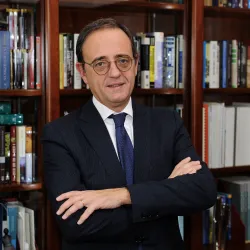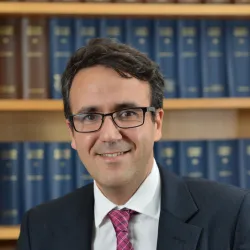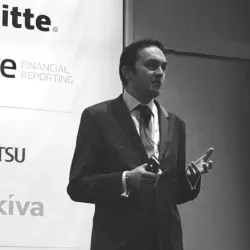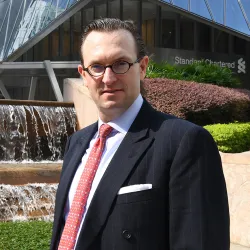Prudential Regulation and Supervision: Challenges in an Era of Financial Disruption - main page
Prudential Regulation and Supervision - main page
Prudential Regulation and Supervision: Challenges in an Era of Financial Disruption
March 15 - 18
Chair: Maria Nieto, Senior Advisor in the directorate of financial stability, regulation and resolution, Bank of Spain
- How has Covid-19 impacted the supervision and regulation of financial markets?
- How can climate related risks be implemented into the design of prudential regulation?
- What should the financial regulatory responses be to CBDCs, stablecoins and crypto assets?
- How can authorities effectively support innovation?
These are among the main challenges facing regulators and supervisors in 2021, as economies and markets look to recover from the Covid-created economic emergency of 2020. More broadly, further disruptive forces are being unleashed through the introduction of new technologies and climate policies. Combined, these are impacting supervisory and regulatory frameworks in unprecedented ways.
Chaired by European regulatory expert Maria Nieto and a roster of speakers from central banks around the world, this new course will address the key challenges confronting the regulatory and supervisory community. Participants will gain a deeper understanding of: how to manage the financial risk of climate change and the best way to respond as regulators, technological disruptions such as CBDCs and the management of innovation, cyber resilience at a time of remote working, and emerging standards in financial regulation broadly.
Each day will feature three hours of expert-led live content to maximize the opportunity to share and learn. The Course chair will ensure participants have opportunities to network throughout the programme.
APAC timezone: 2pm-5pm (SGT) | 6am-9am (GMT) | 1am-4am (ET)
Prudential regulation and supervision: challenges in an era of financial disruption agenda
Current landscape of regulatory and supervisory challenges
06:00 – 06:15
Course introduction
Course introduction session led by the chair
06:00 - 06:15
- Introductions and welcome from the chairperson
- Overview of the training course
- Discussion of the delegate expectations
Maria Nieto
Advisor in the Directorate of Financial Stability, Regulation and Resolution
Bank of Spain
María J. Nieto is Associate to the Director General, Banking Regulation at Bank of Spain where she has developed different responsibilities in the realm of financial stability and its regulatory framework including crisis management since December 2000. Ms Nieto has been a contributor to the Basel Committee of Banking Supervisors as well as the European Commission, BIS, ECB and OECD. She is author of several articles on banking and regulatory issues that have been published by prestigious journals and member of the Editorial Boards of the Journal of Banking Regulation and the Journal of Financial Regulation and Compliance. She has cooperated as consultant with the IMF and the Federal Reserve Bank of Atlanta and has worked at the ECB, Council of Economic Advisors to the Spanish President, the EBRD and the IMF. Ms Nieto earned a PhD cum laude from the Universidad Complutense de Madrid and a MBA from the University of California Los Angeles.
06:15 – 06:45
The current regulatory and supervisory landscape
06:15 - 06:45
- An overview of the regulatory agenda
- The reinforced role of supervision: key focus points
- The main challenges for the financial sector in an era of innovation and climate change transition
Pedro Duarte Neves is Adviser for the Board of Directors of Banco de Portugal. He was Vice-Governor of Banco de Portugal from June 2006 to September 2017. Pedro Duarte Neves participated at the main high-level supervisory and regulatory fora like the EBA, SSM, ESRB, and FSB. He was Alternate Chairperson of the EBA from July 2013 to June 2018 and he has chaired a number of committees in the scope of the FSB, EBA, and the Joint Committee of the ESAs. His research interests include banking supervision and regulation, macro-prudential policy, and the real economy.
Pedro Duarte Neves is a Visiting Professor at Católica Lisbon School of Business and Economics. He is also Associate at the Systemic Risk Centre, London School of Economics. Pedro Duarte Neves holds a PhD in Economics from Université Catholique de Louvain. He published in scientific journals like The Journal of Econometrics, Economics Letters and Economic Modelling.
06:45 – 07:00
Break
06:45 - 07:00
07:00 – 07:45
Bank recovery and resolution vs bank liquidation: the state of affairs in the aftermath of the Covid-19
07:00 - 07:45
- Bank recovery and resolution: the EU experience and the implementation challenges
- Bank liquidation: instruments or actions available in bank insolvency
- The use of technology for resolution (ResTech)
07:45 – 08:00
Break
07:45 - 08:00
08:00 – 08:45
Basel III and the Covid 19 crisis
06:00 - 06:45
- How has Covid-19 impacted Basel III?
- Release of capital buffers (structural vs cyclical buffers) as an immediate response to the crisis of Covid-19
- Release of liquidity buffers as an immediate response to the crisis of Covid-19
- Has the Basel III agreement proved sufficient in this recent crisis? A critical assessment
Bozena Gulija
Financial regulation and risk management expert
Former Croatian National Bank and European Court of Auditors
Bozena Gulija is a financial sector professional with primary expertise in banking regulation and risk management, whose experience spans the private and public sector across several jurisdictions (EU, Netherlands, Belgium, Germany, Luxembourg and Croatia). She has worked for private companies including ABN AMRO, Euroclear, State Street, Nordea, and Intesa Sanpaolo Group, and public institutions such as the European Court of Auditors, the Croatian National Bank, and the Institute for International Relations. Bozena has been actively collaborating with several professional and academic institutions through lectures and research projects (e.g. Warwick University, Zagreb University, IADI-BIS, Central Banking, Risk.net) and as an author and reviewer (e.g. Financial Regulation International, IFLR - International Financial Law Journal, Journal of Banking Regulation).
Linkedin: https://www.linkedin.com/in/bozenagulija
Learning from Covid-19 and looking to the future
06:00 – 06:45
Integrating climate related and environmental risks into prudential supervision
08:00 - 08:45
- What is the role of the supervisor in urging financial institutions to manage climate related risks?
- How can regulators and supervisors support a green recovery from the pandemic?
Gábor Gyura has a masters degree in Economics and also holds a PhD in Earth Sciences. He was founding head of the Sustainable Finance Department at the Central Bank of Hungary and was responsible for the Bank’s green agenda between 2018 and 2022. His main work area was the development of the domestic green finance market and the improvement of environmental risk management in the financial system, also representing the Bank in various international committees related to sustainable and climate finance such as the Network for Greening the Financial System (NGFS) and the European Supervisory Authorities. Since May 2022 Gabor is a consultant at the United Nations Environment Program Finance Initiative (UNEPFI), and since 2021 also acts as assistant professor at the Budapest University of Technology and Economics’ Finance Department, teaching and researching sustainable finance.
06:45 – 07:00
Break
06:45 - 07:00
07:00 – 07:45
Stress testing banks: a comparative analysis - have we learnt anything from the Covid-19 crisis?
07:00 - 07:45
- Why stress test? Founding principles and motivations
- Microprudential vs sytem wide bank stress testing: How do they differ?
- Microprudential stress testing: an inter-country comparison
- Case study: Stress testing as a prudential regulatory tool
Jérôme Henry
Principal adviser, macroprudential policy and financial stability
European Central Bank
Jérôme Henry is the principal adviser in the European Central Bank (ECB) macroprudential policy and financial stability division. His responsibilities cover financial stability assessments and the related infrastructure requirements. Henry has led ECB teams for quality assurance of the single supervisory mechanism stress tests and was involved in country crisis management. He also worked at the Bank for International Settlements as a Financial Stability Institute fellow. Prior to this, Henry was a long-standing Eurosystem forecast co-ordinator. He started his time at the ECB leading the macromodelling team. Prior to his central bank career, Henry conducted research at the French Economic Observatory and the French National Institute of Statistics and Economic Studies. He is a founding member of the Centre for Economic Policy Research Euro Area Business Cycle Network. An Ensae Paris graduate, Henry holds a PhD in Economics and a bachelors degree in History from Paris Sorbonne.
07:45 – 08:00
Break
07:45 - 08:00
08:00 – 08:45
Debt restructuring in the Covid-19 era: Reassessing insolvency procedures and sovereign debt restructuring
08:00 - 08:45
- Requirements of effective corporate liquidation procedures
- Corporate debt: Out of court vs court supervised procedures
- Sovereign debt restructuring: recent initiatives proposed by the G-20
Rodrigo Olivares-Caminal is a Professor in Banking and Finance Law at the Centre for Commercial Law Studies (CCLS) at Queen Mary University of London. Prior to joining CCLS he was a Senior Lecturer in Financial Law and the Academic Director at the Centre for Financial and Management Studies (SOAS), University of London and the School of Law, University of Warwick. He taught in undergraduate and postgraduate courses in various Schools of Law and Business Schools in the United Kingdom, Spain, Greece, France and Argentina as well as in professional training courses in Africa, Asia and Europe. He has acted as a Sovereign Debt Expert for the United Nations Conference on Trade and Development (UNCTAD), Senior Insolvency Expert for the World Bank / IFC and as a consultant to several multilateral institutions in Washington DC and Europe, Central Banks and Sovereign States as well as in several international transactions with Law Firms. He specialises in international finance and insolvency law. He is the author/editor of seven books and has extensively published in peer-reviewed journals. He sits in the editorial/advisory board of several law journals in the UK and US and is a member of national and international institutions and associations specialised in comparative commercial and insolvency law.
Towards a framework for disruptive technologies
06:00 – 06:45
Digital money: CBDCs, stablecoins and crypto assets – what prudential regulators and supervisors need to know
06:00 - 06:45
- Taxonomy of digital money definitions, differences and overlaps
- Implications for systemic risk, payments markets and central banking
- Frameworks for regulating and supervising privately issued crypto assets and stablecoins
- Discussion: do CBDCs represent a realistic and desirable goal?
Gabriel Söderberg is a Senior Economist at Sveriges Riksbank and an Associate Professor in economic history at Uppsala University. He works with the Riksbank’s CBDC project and related developments in the financial and payments sectors. As a university researcher he currently investigates and writes a book on the nature of economic – including monetary and financial - instability and how society deals with them.
06:45 – 07:00
Break
06:45 - 07:00
07:00 – 07:45
Regtech & suptech: technological foundations in focus
07:00 - 07:45
- Overview of the latest developments in regtech and suptech
- The impact of regtech and suptech on supervisors and the supervised
- Big data, machine learning and cloud services – examples of practical applications
- Workshop: how to effectively coordinate the innovations efforts of the regulator and the regulated?
07:45 – 08:00
Break
07:45 - 08:00
08:00 – 08:45
Sandboxes, incubators and accelerators: the key pillar of building compliant innovation
08:00 - 08:45
- Sandboxes, incubators and accelerators: a central bankers guide
- Role and functions in innovation strategies
- Tips for helping innovation comply with legal and regulatory requirements
- Issues for funding resourcing cross-jurisdictional cooperation
Douglas W. Arner is the Kerry Holdings Professor in Law, RGC Senior Fellow in Digital Finance and Sustainable Development and Associate Director of the HKU-Standard Chartered Foundation FinTech Academy at the University of Hong Kong. In addition, he is Associate Dean (Taught Postgraduate and Development) of the Faculty of Law at HKU and co-founder and former Director of HKU’s Asian Institute of International Financial Law, as well as Faculty Director and co-founder of the LLM in Compliance and Regulation, the LLM in Corporate and Financial Law, the Law, Innovation, Technology and Entrepreneurship (LITE), and the East Asian International Economic Law and Policy Programmes. Douglas served as Head of the HKU Department of Law from 2011-2014, as Director of the Duke University-HKU Asia America Institute in Transnational Law from 2005-2016, and as an inaugural member of the Hong Kong Financial Services Development Council from 2013-2019. In 2020 he was awarded an inaugural Hong Kong Research Grants Council Senior Fellowship to study the role of digital finance in financial inclusion and the UN Sustainable Development Goals. Douglas is a Visiting Professor and Senior Visiting Fellow of Melbourne Law School of the University of Melbourne, a Visiting Professorial Fellow of the Faculty of Law of UNSW Sydney, a non-executive director of NASDAQ and Euronext listed biotechnology firm Aptorum Group, an Advisory Board Member of the Global Impact FinTech (GIFT) Forum, Policy 4.0 and of the Centre for Finance, Technology and Entrepreneurship (CFTE), and co-founder and an executive board member of the Asia Pacific Structured Finance Association. Douglas has published eighteen books and more than 200 articles, chapters and reports on international financial law and regulation, including most recently Reconceptualising Global Finance and its Regulation (Cambridge 2016) (with Ross Buckley and Emilios Avgouleas) and The RegTech Book (Wiley 2019 (Janos Barberis and Ross Buckley). His recent papers are available on SSRN at https://papers.ssrn.com/sol3/cf_dev/AbsByAuth.cfm?per_id=524849 , where he is among the top 50 authors in the world and among the top 15 authors in the area of law by total downloads. Douglas led the development of Introduction to FinTech – launched with edX in May 2018 and now with over 100,000 learners spanning almost every country in the world – and the foundation of the edx-HKU Online Professional Certificate in FinTech. In addition, he has served as a consultant with, among others, the World Bank, Asian Development Bank, UN, APEC, Alliance for Financial Inclusion, and European Bank for Reconstruction and Development. He has lectured, co-organised conferences and seminars and been involved with financial sector reform projects around the world. Douglas has been a visiting professor or fellow at Duke, Harvard, the Hong Kong Institute for Monetary Research, IDC Herzliya, McGill, Melbourne, National University of Singapore, University of New South Wales, Shanghai University of Finance and Economics, and Zurich, among others.Douglas W. Arner is the Kerry Holdings Professor in Law, RGC Senior Fellow in Digital Finance and Sustainable Development and Associate Director of the HKU-Standard Chartered Foundation FinTech Academy at the University of Hong Kong. In addition, he is Associate Dean (Taught Postgraduate and Development) of the Faculty of Law at HKU and co-founder and former Director of HKU’s Asian Institute of International Financial Law, as well as Faculty Director and co-founder of the LLM in Compliance and Regulation, the LLM in Corporate and Financial Law, the Law, Innovation, Technology and Entrepreneurship (LITE), and the East Asian International Economic Law and Policy Programmes. Douglas served as Head of the HKU Department of Law from 2011-2014, as Director of the Duke University-HKU Asia America Institute in Transnational Law from 2005-2016, and as an inaugural member of the Hong Kong Financial Services Development Council from 2013-2019. In 2020 he was awarded an inaugural Hong Kong Research Grants Council Senior Fellowship to study the role of digital finance in financial inclusion and the UN Sustainable Development Goals. Douglas is a Visiting Professor and Senior Visiting Fellow of Melbourne Law School of the University of Melbourne, a Visiting Professorial Fellow of the Faculty of Law of UNSW Sydney, a non-executive director of NASDAQ and Euronext listed biotechnology firm Aptorum Group, an Advisory Board Member of the Global Impact FinTech (GIFT) Forum, Policy 4.0 and of the Centre for Finance, Technology and Entrepreneurship (CFTE), and co-founder and an executive board member of the Asia Pacific Structured Finance Association. Douglas has published eighteen books and more than 200 articles, chapters and reports on international financial law and regulation, including most recently Reconceptualising Global Finance and its Regulation (Cambridge 2016) (with Ross Buckley and Emilios Avgouleas) and The RegTech Book (Wiley 2019 (Janos Barberis and Ross Buckley). His recent papers are available on SSRN at https://papers.ssrn.com/sol3/cf_dev/AbsByAuth.cfm?per_id=524849 , where he is among the top 50 authors in the world and among the top 15 authors in the area of law by total downloads. Douglas led the development of Introduction to FinTech – launched with edX in May 2018 and now with over 100,000 learners spanning almost every country in the world – and the foundation of the edx-HKU Online Professional Certificate in FinTech. In addition, he has served as a consultant with, among others, the World Bank, Asian Development Bank, UN, APEC, Alliance for Financial Inclusion, and European Bank for Reconstruction and Development. He has lectured, co-organised conferences and seminars and been involved with financial sector reform projects around the world. Douglas has been a visiting professor or fellow at Duke, Harvard, the Hong Kong Institute for Monetary Research, IDC Herzliya, McGill, Melbourne, National University of Singapore, University of New South Wales, Shanghai University of Finance and Economics, and Zurich, among others.
Resilience of the financial system
06:00 – 06:45
Shadow banking sector in the context of the Covid-19 crisis: What was different this time?
06:00 - 06:45
- Recent evolution of the shadow banking sector
- Key features of institutional make-up and interconnections with the regulated sector
- The role of the shadow banking in the market turmoil caused by the Covid-19 crisis Discussion: effective regulatory responses in delegates’ home jurisdictions
Douglas W. Arner is the Kerry Holdings Professor in Law, RGC Senior Fellow in Digital Finance and Sustainable Development and Associate Director of the HKU-Standard Chartered Foundation FinTech Academy at the University of Hong Kong. In addition, he is Associate Dean (Taught Postgraduate and Development) of the Faculty of Law at HKU and co-founder and former Director of HKU’s Asian Institute of International Financial Law, as well as Faculty Director and co-founder of the LLM in Compliance and Regulation, the LLM in Corporate and Financial Law, the Law, Innovation, Technology and Entrepreneurship (LITE), and the East Asian International Economic Law and Policy Programmes. Douglas served as Head of the HKU Department of Law from 2011-2014, as Director of the Duke University-HKU Asia America Institute in Transnational Law from 2005-2016, and as an inaugural member of the Hong Kong Financial Services Development Council from 2013-2019. In 2020 he was awarded an inaugural Hong Kong Research Grants Council Senior Fellowship to study the role of digital finance in financial inclusion and the UN Sustainable Development Goals. Douglas is a Visiting Professor and Senior Visiting Fellow of Melbourne Law School of the University of Melbourne, a Visiting Professorial Fellow of the Faculty of Law of UNSW Sydney, a non-executive director of NASDAQ and Euronext listed biotechnology firm Aptorum Group, an Advisory Board Member of the Global Impact FinTech (GIFT) Forum, Policy 4.0 and of the Centre for Finance, Technology and Entrepreneurship (CFTE), and co-founder and an executive board member of the Asia Pacific Structured Finance Association. Douglas has published eighteen books and more than 200 articles, chapters and reports on international financial law and regulation, including most recently Reconceptualising Global Finance and its Regulation (Cambridge 2016) (with Ross Buckley and Emilios Avgouleas) and The RegTech Book (Wiley 2019 (Janos Barberis and Ross Buckley). His recent papers are available on SSRN at https://papers.ssrn.com/sol3/cf_dev/AbsByAuth.cfm?per_id=524849 , where he is among the top 50 authors in the world and among the top 15 authors in the area of law by total downloads. Douglas led the development of Introduction to FinTech – launched with edX in May 2018 and now with over 100,000 learners spanning almost every country in the world – and the foundation of the edx-HKU Online Professional Certificate in FinTech. In addition, he has served as a consultant with, among others, the World Bank, Asian Development Bank, UN, APEC, Alliance for Financial Inclusion, and European Bank for Reconstruction and Development. He has lectured, co-organised conferences and seminars and been involved with financial sector reform projects around the world. Douglas has been a visiting professor or fellow at Duke, Harvard, the Hong Kong Institute for Monetary Research, IDC Herzliya, McGill, Melbourne, National University of Singapore, University of New South Wales, Shanghai University of Finance and Economics, and Zurich, among others.Douglas W. Arner is the Kerry Holdings Professor in Law, RGC Senior Fellow in Digital Finance and Sustainable Development and Associate Director of the HKU-Standard Chartered Foundation FinTech Academy at the University of Hong Kong. In addition, he is Associate Dean (Taught Postgraduate and Development) of the Faculty of Law at HKU and co-founder and former Director of HKU’s Asian Institute of International Financial Law, as well as Faculty Director and co-founder of the LLM in Compliance and Regulation, the LLM in Corporate and Financial Law, the Law, Innovation, Technology and Entrepreneurship (LITE), and the East Asian International Economic Law and Policy Programmes. Douglas served as Head of the HKU Department of Law from 2011-2014, as Director of the Duke University-HKU Asia America Institute in Transnational Law from 2005-2016, and as an inaugural member of the Hong Kong Financial Services Development Council from 2013-2019. In 2020 he was awarded an inaugural Hong Kong Research Grants Council Senior Fellowship to study the role of digital finance in financial inclusion and the UN Sustainable Development Goals. Douglas is a Visiting Professor and Senior Visiting Fellow of Melbourne Law School of the University of Melbourne, a Visiting Professorial Fellow of the Faculty of Law of UNSW Sydney, a non-executive director of NASDAQ and Euronext listed biotechnology firm Aptorum Group, an Advisory Board Member of the Global Impact FinTech (GIFT) Forum, Policy 4.0 and of the Centre for Finance, Technology and Entrepreneurship (CFTE), and co-founder and an executive board member of the Asia Pacific Structured Finance Association. Douglas has published eighteen books and more than 200 articles, chapters and reports on international financial law and regulation, including most recently Reconceptualising Global Finance and its Regulation (Cambridge 2016) (with Ross Buckley and Emilios Avgouleas) and The RegTech Book (Wiley 2019 (Janos Barberis and Ross Buckley). His recent papers are available on SSRN at https://papers.ssrn.com/sol3/cf_dev/AbsByAuth.cfm?per_id=524849 , where he is among the top 50 authors in the world and among the top 15 authors in the area of law by total downloads. Douglas led the development of Introduction to FinTech – launched with edX in May 2018 and now with over 100,000 learners spanning almost every country in the world – and the foundation of the edx-HKU Online Professional Certificate in FinTech. In addition, he has served as a consultant with, among others, the World Bank, Asian Development Bank, UN, APEC, Alliance for Financial Inclusion, and European Bank for Reconstruction and Development. He has lectured, co-organised conferences and seminars and been involved with financial sector reform projects around the world. Douglas has been a visiting professor or fellow at Duke, Harvard, the Hong Kong Institute for Monetary Research, IDC Herzliya, McGill, Melbourne, National University of Singapore, University of New South Wales, Shanghai University of Finance and Economics, and Zurich, among others.
06:45 – 07:00
Break
06:45 - 07:00
07:00 – 07:45
Cyber resilience of digitalized ecosystems: roles and responsibilities of regulators and supervisors
07:00 - 07:45
- Building blocks of an effective cyber resilience framework
- The role of intelligence-led exercises in cyber resilience strategies
- Examples of initiatives facilitating cooperation and coordination between the regulator and the regulated
- Discussion: what cyber risks do regulators and supervisors need to focus on as a priority? Have cyber risks being reassessed in the covid -19 crisis?
Manit Sahib is the Head of Penetration Testing at the Bank of England. He is an Offensive Security (OSCP) and CREST certified tester with NCSC’s CHECK status. Previously a security consultant at PwC, he has obtained a vast amount of technical experience from a variety of global organisations. Now, leading BoE’s offensive team to plug the gaps in a collaborative approach.
07:45 – 08:00
Break
06:45 - 07:00
08:00 – 08:30
Closing remarks and delegate action plans
Concluding session led by the chair
08:00 - 08:30
- Summary of the course
- Discussion of the observed trends and case studies
- Application of learning points in the delegates’ home organisations
- Preparation of action points
Maria Nieto
Advisor in the Directorate of Financial Stability, Regulation and Resolution
Bank of Spain
María J. Nieto is Associate to the Director General, Banking Regulation at Bank of Spain where she has developed different responsibilities in the realm of financial stability and its regulatory framework including crisis management since December 2000. Ms Nieto has been a contributor to the Basel Committee of Banking Supervisors as well as the European Commission, BIS, ECB and OECD. She is author of several articles on banking and regulatory issues that have been published by prestigious journals and member of the Editorial Boards of the Journal of Banking Regulation and the Journal of Financial Regulation and Compliance. She has cooperated as consultant with the IMF and the Federal Reserve Bank of Atlanta and has worked at the ECB, Council of Economic Advisors to the Spanish President, the EBRD and the IMF. Ms Nieto earned a PhD cum laude from the Universidad Complutense de Madrid and a MBA from the University of California Los Angeles.
Central Banking’s Post Training is a chair-led forum where participants can bring further questions or discussion points to group, after the live content and self-paced learning elements. What has worked, and what has not? Post Training focuses on questions that may have arisen since returning, the challenges of implementation and the setting of medium-term goals. Participants are encouraged to bring a short presentation, or questions on a particular topic, to gain the most from the discussions with peers.
12:00 – 13:00
Implementation Workshop
11:00 - 12:00
Benefits of attending the Implementation Workshop:
- Developments in the area since the live content sessions, including new resource material
- Questions arising since returning to the central bank
- Challenges of implementation: where are the roadblocks?
- Medium-term goals: what is realistic?
- Establishment of group network to keep in touch with peers and share best practices
Learning outcomes
By the end of the training course, participants will be able to:
- Understand the regulatory agenda and current supervisory landscape
- Integrate climate and environmental risks in to prudential supervision
- Use learnings from the Covid-19 crisis to create a sound stress testing framework
- Create a framework for regulating and supervising privately issued crypto assets and stablecoins
- Help innovation be compliant with legal. Ethical and regulatory requirements
Chair
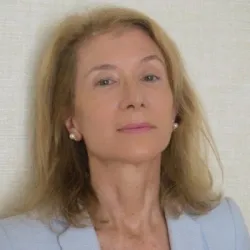
Maria Nieto
London School of Economics
Visiting senior fellow
María J. Nieto (PhD) is a Visiting Senior Fellow at the London School of Economics (Grantham Research Institute), Member of EBI and former Senior Advisor at Bank of Spain. She is author of numerous peer-reviewed articles (Journal of Banking and Finance, Journal of Financial Stability, Journal of International Financial Markets, Institutions and Money among others). She has cooperated as advisor with the International Monetary Fund and the Federal Reserve Bank of Atlanta for over 10 years and she serves on the advisory boards of the Journal of Financial Regulation and Compliance, the Journal of Financial Regulation, the Central Banking Training Advisory Board (UK) and the Institute of International Monetary Economics (UK). She has a PhD from University Complutense de Madrid, an MBA in finance from the University of California, Los Angeles (UCLA), and is a Certified Public Accountant (CPA)

